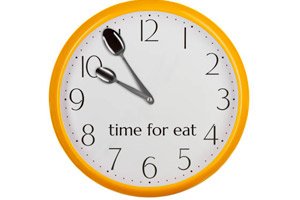
All iLive content is medically reviewed or fact checked to ensure as much factual accuracy as possible.
We have strict sourcing guidelines and only link to reputable media sites, academic research institutions and, whenever possible, medically peer reviewed studies. Note that the numbers in parentheses ([1], [2], etc.) are clickable links to these studies.
If you feel that any of our content is inaccurate, out-of-date, or otherwise questionable, please select it and press Ctrl + Enter.
Diet by the hour without harming your sleep: what does this mean for those who are losing weight
Last reviewed: 18.08.2025
 ">
">Time-restricted eating (TRE) is eating within a fixed “window” (usually 8–10 hours a day) without necessarily counting calories. The idea is that it is important not only what and how much we eat, but also when. Such regimens improve weight, glucose, blood pressure, and lipids in some people. But with sleep, everything turned out to be more complicated: the data is contradictory.
What is TRE and why is there so much fuss about it?
Time-restricted eating (TRE) is eating within a fixed window of the day (usually 8–10 hours) without strict calorie counting. This approach is convenient, so it quickly gained popularity: it is easier to implement in everyday life than classic diets. Randomized trials and meta-analyses show moderate benefits for body weight, glycemia, blood pressure, and lipids, especially in people with excess weight and prediabetes.
Circadian biology suggests that “when” may be as important as “how much”
Humans have internal clocks that set daily fluctuations in insulin sensitivity, thermogenesis, secretion of gastrointestinal hormones, and gastric acidity. Nutrition is a powerful "zeitgeber" (external synchronizer) for the peripheral clocks of the liver, intestines, and adipose tissue. Theoretically, shifting calories early (to the first half of the day) and stopping eating 2–4 hours before bedtime should help both metabolism and sleep.
New work: we checked not only “what worked”, but also “when there is better”
A commentary on the study by Clavero-Jimeno et al. discusses a 12-week experiment with four groups of overweight/obese adults aged 30–60 years (~50 people each). All were recommended to follow a Mediterranean diet, with only the duration and timing of the eating window varying:
- control - normal mode, window >12 h;
- early TRE - 8 hours, start before 10:00;
- later TRE - 8 hours, start after 13:00;
- "self-selected" TRE - 8 hours of the participant's choice.
Sleep was assessed twice for 14 days (before the start and at the end of the intervention) - subjectively and according to fitness bracelets. Depression, anxiety, stress and quality of life were also measured.
Result: neither early, nor late, nor "self-selected" TRE differed from the control in terms of sleep quality, mood, stress, and quality of life. That is, no noticeable harm or benefit was seen for these indicators.
Why the effect could be “hidden”
The authors of the commentary (Christian Benedict, Leonie Heilbronn) list important nuances:
- Participants initially slept well overall and complained little about stress and anxiety—there was no room for improvement.
- Accelerometers underestimate sleep fragmentation and do not show the distribution of sleep stages; however, sleep regularity (an important predictor of health) was not analyzed at all.
- The “early” window of before 10:00 a.m. onset for the Spanish sample with late bedtimes is not that early. The chronotype, composition and caloric content of the last meal, screen time, and menopausal changes in some women could all have blurred the effect.
- Within-group improvements in late TRE were noted, but these were not analyzed separately, so it is too early to draw conclusions.
Mechanisms: Pros and Cons
Potential benefits of TRE for sleep:
- finish eating 2-4 hours before bedtime - there is less risk of nighttime heartburn and sugar surges;
- A stable last meal time is an additional zeitgeber (external "time stamp") for the circadian clock.
Potential harm:
- feeling hungry or stress due to a strict regime can interfere with falling asleep;
- A very fatty late dinner can make sleep worse for some people.
What does this mean for you?
- For weight loss, TRE remains effective and does not appear to impair sleep for most.
- For sleep, focus on the basics: regular bedtimes and wake-up times, light in the morning, less caffeine and alcohol in the evening, and a cool bedroom.
- If you want to try TRE, start softly:
- choose a stable 8-10 hour window;
- finish eating 3-4 hours before bed;
- choose the time according to your chronotype (lark/owl);
- lighten your last meal (not too fatty).
If your sleep has noticeably worsened, loosen your regime or return to your normal schedule.
What else needs to be explored
Longer and more personalized protocols, taking into account chronotype, composition of last meal, menopause; objective metrics of sleep regularity and stages; comparison of “early” and “late” windows in different cultures.
The study was published in the journal JAMA Network Open.
